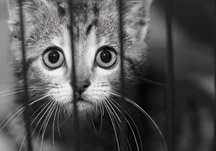Secaucus will issue a letter to residents this week that informs them about a Trap-Neuter-Return (TNR) program the town has launched to stabilize the feral and stray cat population.
The town plans to increase efforts to get socialized cats adopted, implement strategies to attract the cats to areas where they are allowed and away from areas where they are not welcome, and to try to trap and neuter stray cats.
The letter indicates that the program will be rolled out in phases.
“The problem is not just here but all over the country,” said Mayor Michael Gonnelli. “Even if you trap them and put them someplace else, they will only come back. The whole idea is to stop them from reproducing.”
“The whole idea is to stop them from reproducing.”— Mayor Michael Gonnelli
____________
The stray and feral cat population across the country is said to rival that of the pet cat population, which was at 82 million as of 2007 according to the American Veterinary Medical Association. Only 2.3 percent of stray and feral cats are neutered, whereas 82 percent of household cats are neutered. This would indicate that stray and feral cats are responsible for most of the kittens born throughout the country.
A TNR program humanely traps cats, spays or neuters and vaccinates them, then returns them to the wild. Unable to mate, the street cat population is significantly reduced.
The program has been controversial in some towns. Some officials believe that stray cats spread disease and should be euthanized.
Gonnelli, Councilwoman Susan Pirro, the town veterinarian, Dr. John Hatch, along with the town animal shelter, are working together to come up with strategies.
“I’ve been active with the shelter itself,” said Pirro. “We did a first wave of picking up kittens. We still have a number of kittens available at the shelter. We are going to get the second wave. If residents make us aware that there are kittens in the backyard, we will pick them up.”
The Secaucus Animal Shelter is a no-kill shelter, as per a town resolution.
Counting cats
The letter includes a questionnaire that asks residents whether they are currently providing care for cats, whether they have spayed or neutered their own pets, and if they have any particular concerns or complaints about cats. The questionnaire also serves as a tool to conduct an inventory of the current feral and stray cat population for the town to determine the scope of the problem.
The town is starting out small and neutering or spaying two cats a day.
Pirro says she is looking into grants to support the program and into the possibility of bringing a mobile unit to town.
“It is very costly,” said Gonnelli. “Last year we spent 45,000 on the trap and neuter and release program.”
Gonnelli said that the program is mostly covered by donations and income from issuing cat and dog licenses.
Successful TNR at Harmon Cove
“We have seen a difference in Harmon Cove in three years; we have seen a decline,” said Bridget Gritle, a Secaucus resident who lives in the Harmon Cove development. She volunteers for the condo association and helps run their TNR program. Harmon Cove is comprised of four major sections, and Gritle’s efforts have focused on Harmon Cove 1. The New Jersey Animal Alliance initially helped residents understand how to set traps.
“We have trapped all of our adult cats, and had them neutered, this is the second year we’ve had no new kittens…We re-rereleased them right back into Harmon Cove,” said Gritle.
Gritle estimates that over 50 cats were first trapped and neutered; now 20-25 adult cats remain.
“We’ve been very successful here,” Gritle said. “Before the [TNR] program, I had been trapping myself for 25 years. I trapped them with a mixture of sardines and tuna – they love it!”
Gritle has adopted five cats of her own.
Harmon Cove took the TNR program a step further and built feed stations. Volunteers pitch in, feed the cats, and provide clean water. Volunteers also regularly check the traps, which are set out in the morning and collected before noon.
Harmon Cove condo owners pay into a special cat budget that covers the costs of the TNR and feeding program.
Town residents can call 201-330-2031 if they have any questions. The shelter can be reached at 201-348-3213.
Adriana Rambay Fernández may be reached at afernandez@hudsonreporter.com.
